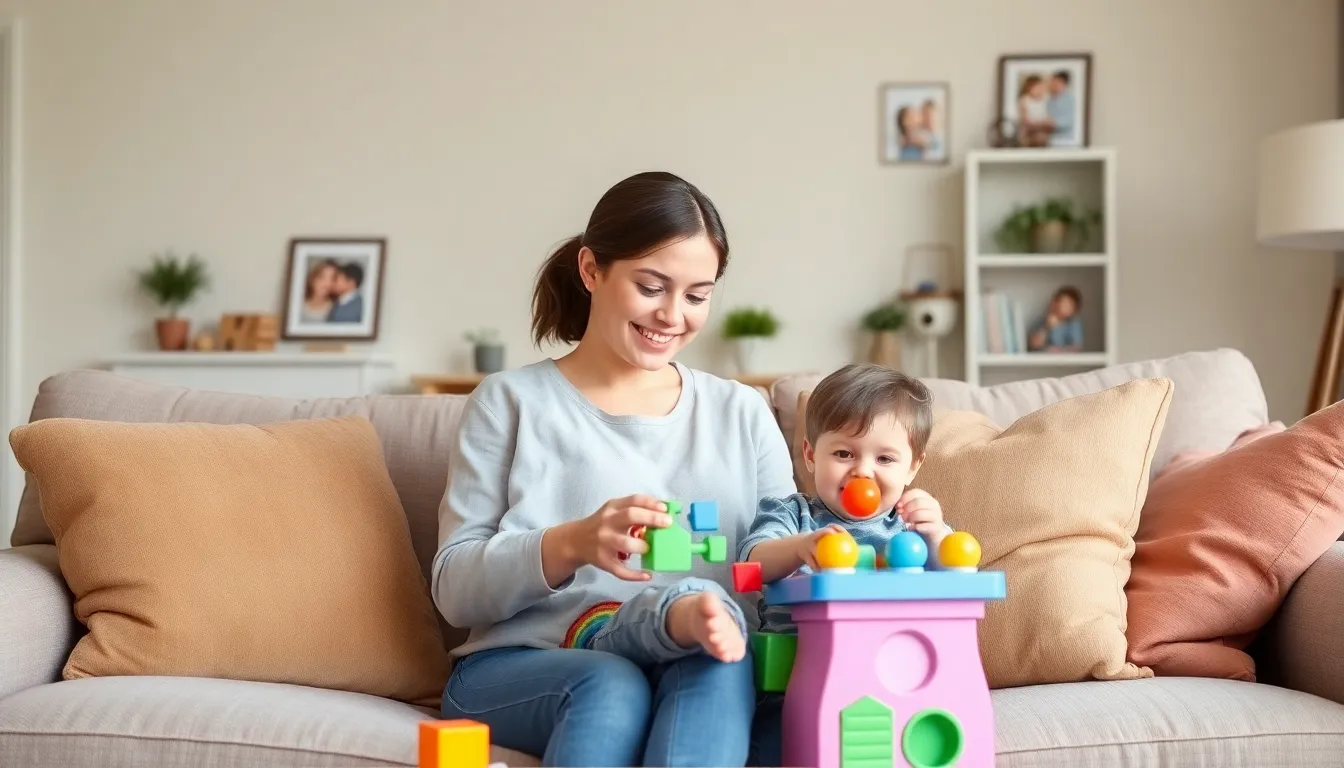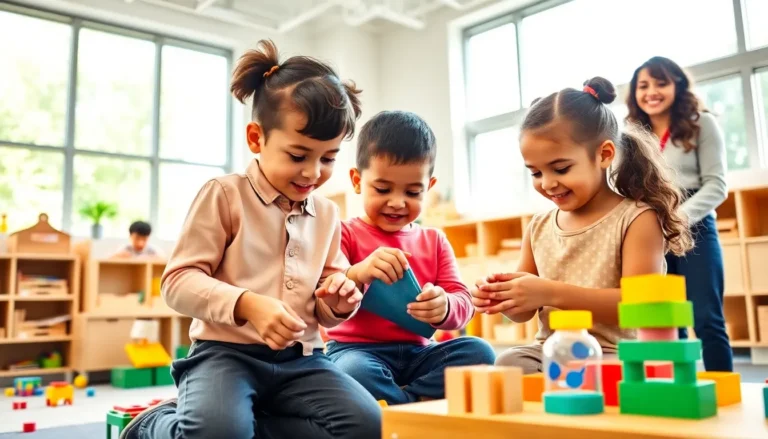Domestic adoption isn’t just about finding a loving home for a child; it’s about creating a family filled with laughter, joy, and the occasional chaos that comes with parenting. Imagine the heartwarming moments of bedtime stories and family game nights, all while knowing you’ve made a life-changing decision. It’s like winning the lottery, but instead of cash, you get cuddles and a lifetime of unforgettable memories.
While the process might seem daunting—like trying to assemble IKEA furniture without the instructions—understanding domestic adoption can be straightforward and rewarding. With the right guidance, anyone can navigate this beautiful journey. So grab a cup of coffee, settle in, and discover how domestic adoption can turn your dreams of parenthood into a delightful reality.
Table of Contents
ToggleUnderstanding Domestic Adoption
Domestic adoption involves adopting a child from within the same country. This form of adoption focuses on creating loving families that offer both stability and emotional support.
Definition of Domestic Adoption
Domestic adoption refers to the legal process by which an individual or couple becomes the permanent, legal parents of a child born in the same country. It encompasses various pathways, including adoption through public agencies, private agencies, and independent adoptions. A child’s biological parents relinquish their parental rights in most cases, making way for new guardians. This process safeguards the child’s best interests and facilitates a loving match between the child and adoptive parents.
Types of Domestic Adoption
Different types of domestic adoption cater to various needs and preferences. Public agency adoption typically involves children in foster care awaiting adoption. A private agency adoption generally connects birth parents with adoptive families that meet their criteria. Independent adoption allows families to directly work with a birth mother without agency involvement. Both open and closed adoptions exist, where openness regarding the birth family varies. Each type of adoption presents distinct procedures and considerations, which families should understand before pursuing their journey.
Benefits of Domestic Adoption

Domestic adoption presents numerous advantages that enhance the lives of everyone involved. Focusing on the emotional, social, and legal aspects, these benefits contribute to a positive experience for children and adoptive parents alike.
For Children
Children in domestic adoption gain access to stable, loving environments that promote their growth and development. They often receive emotional support and nurturing, which fosters healthy attachments. Many adopted children benefit from remaining within their cultural backgrounds, allowing them to connect with their heritage. They also experience opportunities for educational and social enrichment in their new families, enhancing their overall well-being.
For Adoptive Parents
Adoptive parents encounter profound emotional rewards through domestic adoption. They experience the joy of building families and forming lasting bonds with their children. Many adoptive parents find a sense of fulfillment as they provide love and support to a child who needs it. The legal process allows parents to create secure family units, giving them the peace of mind that comes with parental rights. They also join a supportive community of other adoptive families, fostering lifelong friendships and shared experiences.
Challenges of Domestic Adoption
Domestic adoption presents several challenges that prospective parents must navigate. Understanding these challenges is crucial for making informed decisions throughout the adoption process.
Legal Considerations
Legal considerations form a significant part of domestic adoption. Ensuring compliance with state and federal regulations protects the interests of all parties involved. Adoptive parents must complete a home study, undergo background checks, and submit necessary documentation. Each state enforces different laws governing adoption, which can impact timelines and procedures. Families need to consult experienced adoption attorneys to negotiate these complexities effectively. Legal guidance helps navigate potential challenges that may arise, reducing stress throughout the process.
Emotional and Psychological Impact
Emotional and psychological impacts characterized domestic adoption. Adoptive parents often face mixed emotions, including excitement and anxiety. Connecting with a child comes with the responsibility of providing a stable and loving environment, which may feel overwhelming at times. Additionally, children may experience feelings of loss or uncertainty about their identity. Support systems, such as counseling and support groups, play an essential role in helping families process these emotions. Open communication among family members fosters a nurturing atmosphere, promoting healing and bonding throughout this transformative journey.
The Domestic Adoption Process
The domestic adoption process involves several key steps to ensure a smooth transition for families and children. Understanding these steps helps prospective adoptive parents prepare for their journey.
Steps Involved in Domestic Adoption
First, prospective parents select the type of adoption that best suits their needs, whether through a public agency, private agency, or independent pathway. Second, they complete an application with the chosen agency, which often includes background checks and preliminary inquiries. Third, families participate in orientation sessions, providing essential information about the process and expectations. Fourth, they undergo a home study, which assesses readiness for adoption and the home environment. Lastly, families await placement of a child, followed by finalizing the adoption through court proceedings. These steps ensure that the child’s welfare remains paramount and that adoptive parents meet necessary criteria.
Home Study Requirements
Home study requirements serve as a foundation for evaluating prospective adoptive families. Individuals must gather documentation such as financial statements, medical records, and references. Social workers conduct interviews, assessing the family’s motivation and readiness for adoption. Home visits occur to evaluate the living environment, focusing on safety and stability. Additionally, adoptive parents may attend educational sessions covering topics like attachment and parenting strategies. Completing these requirements provides agencies with insight into the family’s dynamics and capacity to provide a loving home, ensuring a positive adoption experience for all involved.
Resources for Domestic Adoption
Resources exist to guide prospective adoptive parents through the domestic adoption process. Agencies and organizations provide essential support, connecting families with children in need of loving homes.
Agencies and Organizations
Adoption agencies offer various services, simplifying the journey to parenthood. Public agencies often focus on children in foster care, facilitating matches with families. Private agencies specialize in domestic placements, assisting birth parents and adoptive families through the legal process. Independent adoption facilitators enable direct connections between birth mothers and prospective parents, allowing more personal communication. Resources such as the Child Welfare Information Gateway serve as valuable hubs for information on state laws and agency options, ensuring families gain clarity as they navigate their choices.
Support Groups and Counseling
Support groups create communities for adoptive families, providing a space for shared experiences and mutual support. Many organizations offer counseling services tailored to the unique emotional landscape of adoption. Sessions may address feelings of loss, identity concerns, and building relationships within the family. Such resources foster open communication and resilience, reinforcing the importance of navigating the emotional journey of adoption together. Connecting with other families through local or online support networks helps reduce feelings of isolation, ensuring families receive the encouragement needed during this transformative experience.
Domestic adoption offers a profound opportunity for families to create lasting bonds filled with love and joy. By understanding the complexities and challenges involved in the process, prospective parents can approach this journey with confidence. The support of experienced agencies and communities can make a significant difference in navigating the emotional landscape of adoption.
Through open communication and shared experiences, families can foster an environment that promotes healing and growth. Ultimately, domestic adoption not only transforms the lives of children but enriches the lives of adoptive parents, creating a tapestry of cherished memories and connections that last a lifetime.




